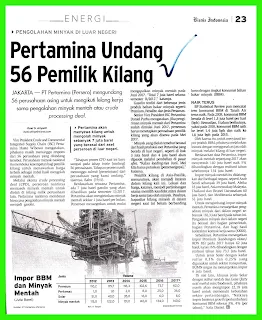The Government of Indonesia and the United States (US) signed a business deal. This time ExxonMobil, a US-based oil and gas company Pertaimina established a liquefied natural gas (LNG) sale business for 20 years.
Head of Communication, Public Information and Cooperation Ministry of Energy and Mineral Resources, Sujatmiko, explained that the import of LNG is due to an increase in gas demand for power plants, "So we anticipate the possibility of increasing domestic consumption," he said on Friday (21/4).
With increasing gas demand, gas supply both domestically and abroad will be needed. In order for gas needs to be met, PT Pertamina is very quick to find LNG supply at affordable prices.
Sujatmiko refused to mention LNG import price agreement between ExxonMobil and Pertamina. The reason this price is done purely by the mechanism of business to business. "Everything if we remember, the president's message to get affordable prices for the people, the source can be from within or outside," he said.
Pertamina has also signed a business deal to import LNG from another Uncle Sam company, Cheniere Corpus Christi. Starting in 2019, Cheniere will export LNG to Indonesia as much as 1.5 million tons per year over the next 20 years.
Besides Cheniere, Pertamina has signed a head of agreement (HOA) with Woodside. Under the agreement, Woodside will import LNG to Pertamina with a capacity of 500,000 tons per year.
Ministry of Energy and Mineral Resources has projected, domestic gas demand will increase from year to year along with the increasing of gas infrastructure development in Indonesia. So that in the next 2019 Indonesia will start importing LNG.
In addition to LNG import cooperation to Indonesia, RI-US also cooperate in electricity sector. One of them is Pacific Infra Capital, PT. Infra Cerdas Indonesia with PT Perusahaan Listrik Negara for the installation of smart metering in Java-Bali power grid.
PLN also signed a business partnership with PowerPhase to install TurboPhase booster system at PLTG. The technology is claimed to reduce fuel consumption, reduce emissions and increase electrical output.
IN INDONESIAN
Pertamina Beli LNG dari ExxonMobil
Pemerintah Indonesia dan Amerika Serikat (AS) meneken kesepakatan bisnis. Kali ini ExxonMobil, perusahaan migas asal AS dan Pertaimina menjalin bisnis jual beli liquefied natural gas (LNG) selama 20 tahun.
Kepala Biro Komunikasi, Layanan Informasi Publik dan Kerjasama Kementerian ESDM Sujatmiko menjelaskan, adanya impor LNG ini karena akan ada peningkatan kebutuhan gas untuk pembangkit Listrik, “Jadi, kita antisipasi kemungkinan peningkaian konsumsi di dalam negeri," ujarnya, Jumat (21/4).
Dengan kebutuhan gas yang meningkat, pasokan gas baik dari dalam negeri maupun luar negeri akan sangat dibutuhkan. Agar kebutuhan gas terpenuhi, PT Pertamina sangat cepat mencari pasokan LNG dengan harga terjangkau.
Sujatmiko tidak mau menyebut kesepakatan harga impor LNG antara ExxonMobil dengan Pertamina. Pasalnya kepakatan harga ini dilakukan murni dengan mekanisme business to business. "Semuanya kalau kita ingat, pesan presiden untuk mendapatkan harga affordable untuk rakyat, sumber bisa dari dalam atau luar," katanya.
Pertamina juga telah meneken kesepakatan bisnis untuk mengimpor LNG dari perusahaan Paman Sam lain, yaitu Cheniere Corpus Christi. Mulai tahun 2019 mendatang, Cheniere akan mengekspor LNG ke Indonesia sebanyak 1,5 juta ton per tahun selama 20 tahun ke depan.
Selain Cheniere, Pertamina tercatat telah menandatangani head of agreement (HOA) dengan Woodside. Dalam kesepakatan tersebut, Woodside akan mengimpor LNG ke Pertamina berkapasitas 500.000 ton per tahun.
Kementerian ESDM telah memproyeksi, kebutuhan gas domestik akan semakin meningkat dari tahun ke tahun seiring semakin banyaknya pembangunan infrastruktur gas di Indonesia. Sehingga pada tahun 2019 mendatang indonesia akan mulai mengimpor LNG.
Selain kerjasama impor LNG ke Indonesia, RI-AS juga melakukan kerjasama di sektor listrik. Salah satunya kerja sama Pacific Infra Capital, PT. Infra Cerdas Indonesia dengan PT Perusahaan Listrik Negara untuk pemasangan smart metering di jaringan listrik Jawa-Bali.
PLN juga meneken kerjasama bisnis dengan PowerPhase untuk pemasangan TurboPhase booster system pada PLTG. Teknologi itu diklaim mengurangi konsumsi bahan bakar, mengurangi emisi dan memperbesar output listrik.
Kontan, Page-14, Saturday, April, 22, 2017








